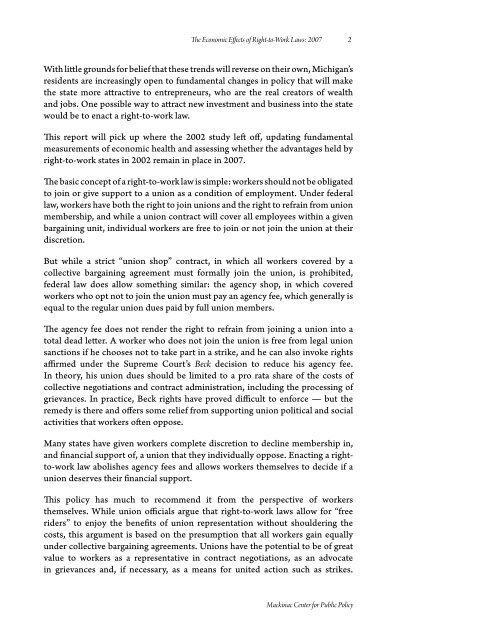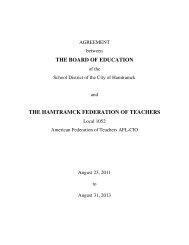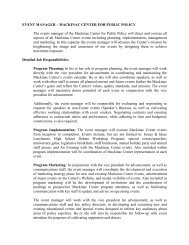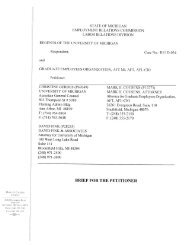The economic effecTs of RighT-To-WoRK LaWs ... - Mackinac Center
The economic effecTs of RighT-To-WoRK LaWs ... - Mackinac Center
The economic effecTs of RighT-To-WoRK LaWs ... - Mackinac Center
Create successful ePaper yourself
Turn your PDF publications into a flip-book with our unique Google optimized e-Paper software.
<strong>The</strong> Economic Effects <strong>of</strong> Right-to-Work Laws: 2007<br />
<br />
With little grounds for belief that these trends will reverse on their own, Michigan’s<br />
residents are increasingly open to fundamental changes in policy that will make<br />
the state more attractive to entrepreneurs, who are the real creators <strong>of</strong> wealth<br />
and jobs. One possible way to attract new investment and business into the state<br />
would be to enact a right-to-work law.<br />
This report will pick up where the 2002 study left <strong>of</strong>f, updating fundamental<br />
measurements <strong>of</strong> <strong>economic</strong> health and assessing whether the advantages held by<br />
right-to-work states in 2002 remain in place in 2007.<br />
<strong>The</strong> basic concept <strong>of</strong> a right-to-work law is simple: workers should not be obligated<br />
to join or give support to a union as a condition <strong>of</strong> employment. Under federal<br />
law, workers have both the right to join unions and the right to refrain from union<br />
membership, and while a union contract will cover all employees within a given<br />
bargaining unit, individual workers are free to join or not join the union at their<br />
discretion.<br />
But while a strict “union shop” contract, in which all workers covered by a<br />
collective bargaining agreement must formally join the union, is prohibited,<br />
federal law does allow something similar: the agency shop, in which covered<br />
workers who opt not to join the union must pay an agency fee, which generally is<br />
equal to the regular union dues paid by full union members.<br />
<strong>The</strong> agency fee does not render the right to refrain from joining a union into a<br />
total dead letter. A worker who does not join the union is free from legal union<br />
sanctions if he chooses not to take part in a strike, and he can also invoke rights<br />
affirmed under the Supreme Court’s Beck decision to reduce his agency fee.<br />
In theory, his union dues should be limited to a pro rata share <strong>of</strong> the costs <strong>of</strong><br />
collective negotiations and contract administration, including the processing <strong>of</strong><br />
grievances. In practice, Beck rights have proved difficult to enforce — but the<br />
remedy is there and <strong>of</strong>fers some relief from supporting union political and social<br />
activities that workers <strong>of</strong>ten oppose.<br />
Many states have given workers complete discretion to decline membership in,<br />
and financial support <strong>of</strong>, a union that they individually oppose. Enacting a rightto-work<br />
law abolishes agency fees and allows workers themselves to decide if a<br />
union deserves their financial support.<br />
This policy has much to recommend it from the perspective <strong>of</strong> workers<br />
themselves. While union <strong>of</strong>ficials argue that right-to-work laws allow for “free<br />
riders” to enjoy the benefits <strong>of</strong> union representation without shouldering the<br />
costs, this argument is based on the presumption that all workers gain equally<br />
under collective bargaining agreements. Unions have the potential to be <strong>of</strong> great<br />
value to workers as a representative in contract negotiations, as an advocate<br />
in grievances and, if necessary, as a means for united action such as strikes.<br />
<strong>Mackinac</strong> <strong>Center</strong> for Public Policy







